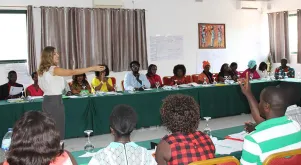"He who has never left his house thinks his mother is the best cook." This Sudanese expression means a lot to Sophie Pereira, 32 years old and Luso-French, who left her long-term position in a consultancy firm in Paris to become an international UN Volunteer in Guinea-Bissau. After a few years of work in the private sector, she felt a call from the non-profit camp.
From June 2018 to July 2020, Sophie was assigned to the Public Information Unit of the UN Integrated Peacebuilding Office in Guinea Bissau (UNIOGBIS) as a Project Manager. Her mission, together with colleagues at UNDP, was to implement a project funded by the Peacebuilding Fund to create enabling conditions for journalists to play a positive role in a democratic society: boosting the media sector in Guinea-Bissau for greater peace.
In Guinea-Bissau, the media environment is characterized by structural financial weakness and inadequate legal and institutional frameworks to regulate the profession. As such, the media are highly vulnerable to political and economic pressures that undermine the sector's credibility.
Sophie’s personal engagement and professionalism were crucial for the successful implementation of the project, which, among other things, contributed to reinforcing the capacities of 150 journalists in media management and law, established the first professional journalism course in the country, strengthened journalists’ associations and the independence of the media through legal reform, stimulated the production of peace-sensitive and investigative journalism and supported the production of the country's first telenovela, focusing on positive social change.
One of Sophie’s heartwarming experiences was helping establish the Bafata Women's Radio, in partnership with the Sevillian Press Association. Bata is the second largest city in the country, with a population of about 300,000 inhabitants.
''It was an ambitious project, because some competing radio stations claimed that it was impossible. My job was to recruits consultants to train 10 journalists, find equipment for them and help them write project proposals. I learned a lot about the situation of women in the country and the challenges they faced when conducting this activity. I then started giving more importance to gender markers when setting up new projects," Sophie explains.
After two years of work, journalists who initially had no training in the subject have become experts and broadcast programmes of excellent quality. They have so many listeners that competing radio stations have also started to hire more women.
Sophie says that becoming a UN Volunteer was one of the best decisions she ever took.
Before this experience, I had mainly been surrounded by people with the same profiles as mine: same age, same socio-professional category, same studies, same job. Arriving at a UN mission, with more than 30 nationalities, was an eye-opener: UN Volunteers were between 26 and 74 years old, with different backgrounds and skills. --Sophie Pereira, UN Volunteer with UNIOGBIS, Guinea-Bissau
Therefore, in addition to professional experience and growth, Sophie learned that "on a personal level, working with different profiles make us more tolerant and open-minded''.

